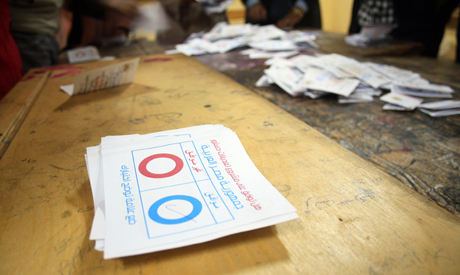 Over the past two days Egyptians have gone back to the polls to vote on their third constitutional referendum in as many years. There has much written about the flaws of the document itself, similar in context and content to the criticism of the December 2012 constitution and the earlier March 2011 constitutional declaration, yet both those referenda passed.
Over the past two days Egyptians have gone back to the polls to vote on their third constitutional referendum in as many years. There has much written about the flaws of the document itself, similar in context and content to the criticism of the December 2012 constitution and the earlier March 2011 constitutional declaration, yet both those referenda passed.
There is no disputing that the current government and ruling military leaders are accountable for the stifled opposition and lack of debate on the document itself. However, it is incorrect to presume that the majority of voters supporting the current leadership have succumbed to the successes of the military propaganda. Whilst Egyptian liberals and activists would much prefer to believe this is all down to General Abdel Fattah al-Sisi’s growing authoritarianism and crackdown on the freedom of the press, civil society and other fundamental human rights, the majority of Egyptians, are still making their own choices, willfully and happily.
It was an argument that resounded among Egyptian elites, so-called liberal politicians and secular activists for over two years: that the Brotherhood and Salafi rise to power through parliamentary and presidential elections was due to the overwhelming poverty and illiteracy that plagues the majority of this country. It was a point I staunchly defended from my own experiences in the electoral processes of this period, and one I still defend now, with one caveat. There may be a large amount of Egyptians that are poor and illiterate, but they are still very much capable of understanding what they want and choosing who they want to deliver on those issues.
The harder fact to comprehend for most observers of this process is that for many Egyptians the constitution and its content simply don’t matter. As Egypt’s referendum coincides with Tunisia’s finally completing its own two-year constitutional drafting process, comparisons are inevitable; the success of Tunisia versus the failures of Egypt. However, ultimately, in both countries, the constitution is not the driving force that defines or determines the success of both respective revolutions. Continued discussions and comparisons between the two fail to address the most important issue, too easily forgotten after three years of upheaval; the original calls of the square: answers to security sector oppression, poverty and corruption.
For Egypt, many have talked about how the revolution has died since the military staged a coup in July 2013. I would argue that we never really had one. It is not the protesters that are the soul of the revolution; it is the message: “bread, freedom, social justice.” This invariably means different things to different people, and everybody involved in the transitional process; politicians (be they Islamist, secular, liberal or otherwise) the military and activists all failed to fundamentally understand their own people and the revolution.
Egyptians are not being forced to choose the military. Rather it is an uncomfortable truth: in associating the turbulent Muslim Brotherhood-led transition of the past two years with democracy, they choose, openly and honestly to take the country back to the perceived stability, both political and economic, experienced under former president Hosni Mubarak (no matter how much we all agree that the ‘bubble’ he created was bound to burst at some point.) Blaming such a mindset on the ‘stupidity’ or ‘ignorance’ of Egyptians is naïve and lazy. There has been no attempt in the past three years to show Egyptians that there is in fact any alternative to the military or Islamist rulers. Whilst secular activists and ‘liberal’ politicians fill the pages of international press, in Egypt they are usually ignored and have been largely politically irrelevant since the overthrow of Hosni Mubarak. Ultimately, had Mohamed Morsi, or Hosni Mubarak before him, improved the economy, there would not have the mass mobilization, at least in such numbers, of the protests that we saw in January 2011 or June 2013.
For now, Egyptians have put their faith back in the military again, for no other reason than the hope that the military, led by General Sisi, will improve the economy, create jobs, and ease the strain of daily life. It is inevitable that should the current leadership fail to deliver on those very demands, much like its predecessors did, they too, shall find themselves facing an angry population that will stand up yet again and demand change. No matter how impossible it may seem right now, no leader, not even General Sisi, is immune to the revolution’s goals.
Hafsa Halawa is a lawyer and a former member of the National Democratic Institute. She was also a long term observer, covering Upper Egypt during the People’s Assembly elections of 2011-12.
Image: Photo: Ahram
